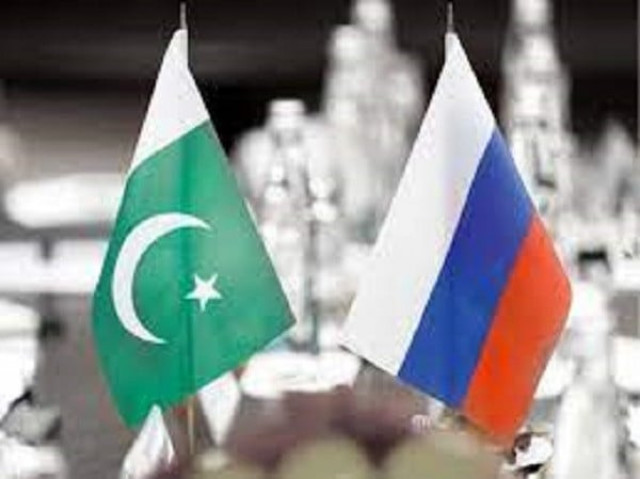Pakistan, Russia eye energy projects
Ink protocol for executing mega schemes, exploring oil and gas deposits

Pakistan and Russia have signed a protocol as part of a comprehensive package to implement mega energy projects and trade oil and gas.
The protocol was inked following the ninth meeting of the Pakistan-Russia Inter-Governmental Commission on Trade, Economic, Scientific and Technical Cooperation.
It covers the energy package, which comprises invitation to Russia to invest in the Pakistan Stream Gas Pipeline (PSGP) project, joint exploration activities with Pakistani oil and gas companies, oil and liquefied natural gas (LNG) supply and offshore drilling.
Both sides agreed that the PSGP project would be considered part of a comprehensive infrastructure programme, aimed at economically viable and sustainable development of gas infrastructure as well as ensuring affordable gas supply.
Pakistan has initiated a detailed study on energy demand and supply, and its infrastructure requirement. Its results will be shared by the third quarter of 2025. Both sides agreed to continue discussions at the relevant Joint Working Group meetings.
Additionally, they noted the successful oil supply to Pakistan through the Inter-Governmental Commission, implemented by the Russia-nominated company, Operational Services Centre. Both sides expressed satisfaction with the plan of allowing the company to continue to play its role in supplying oil and petroleum products. Deliberations under this arrangement will remain underway.
They recognised Gazprom Neft's interest in cooperating with Pakistani oil and gas companies – Oil and Gas Development Company (OGDC), Pakistan Petroleum Limited (PPL) and Mari Petroleum – in oilfield services, potentially through an integrated service model.
They agreed to explore further opportunities for cooperation and discuss potential avenues by the second quarter of 2025.
The two sides noted the interest of autonomous non-commercial organisation, the Institute of Oil and Gas Technological Initiatives (INTI), in holding dialogue with Pakistani oil and gas companies (OGDC, Hydrocarbon Development Institute of Pakistan and Sui companies) and relevant ministries to promote INTI standards and facilitate access to Russian oil and gas equipment in Pakistan.
They will hold online meetings in the first quarter of 2025 to potentially sign memoranda of understanding (MoUs) for further cooperation.
Both parties were informed of Gazprom's interest in exploring LNG supply opportunities from the Portovaya LNG plant in Russia. The Russian side noted Novatek's interest in developing cooperation with Pakistani partners in the gas sector and discussed the possibility of LNG supply as well as participation in the integrated gas projects.
They will work on ensuring long-term LNG supply from the gas processing complex within the Ust-Luga ethane-rich gas processing cluster to Pakistan.
Pakistan observed that a detailed study on energy demand and supply was underway. Based on its findings, the country will decide on LNG purchases and share results by the third quarter of 2025.
Both sides supported negotiations between RusChemAlliance (the project operator) and Pakistan LNG Limited (PLL) for a long-term agreement, contingent upon the study's outcome.
Pakistani stakeholders also highlighted the investment opportunities for oil and gas exploration in offshore zones. In response, Russia requested for technical details to facilitate dialogue on the matter.
Further engagements pertaining to offshore exploration and onshore mature fields were agreed between Zarubezhneft and OGDC, PPL and Mari Petroleum.
The Russian side noted Rosgeo's interest in enhancing cooperation in geology and the diversification of Pakistan's mineral resource base. Rosgeo exchanged contacts with various Pakistani entities such as PPL, Mari Petroleum, OGDC and the Geological Survey of Pakistan.
Both countries agreed to continue cooperation in mining and geological projects as well as mineral exploration, and signed an MoU for collaboration between Rosgeo and PPL in the oil, gas and mineral sectors.
They noted the interest of Russian company Artel in supplying industrial communication systems for Pakistan's oil and gas market. Pakistan will assist Artel in establishing business contacts and holding negotiations with potential customers and partners by the second quarter of 2025.
Russia also wanted to export coal and coal chemical products to Pakistan and handed over a list of issues for detailed consideration. Pakistan will respond with the requested information, including a list of potential customers and consumers of coal and coal chemical products by the second quarter of 2025.
They sought to implement joint projects in hydroelectric power and water management. RusHydro Group, Power Machines and Pakistan Water and Power Development Authority (Wapda) identified five hydropower projects in Pakistan, for which questionnaires would be shared and Wapda would respond within three weeks.
Additionally, both sides supported the participation of Power Machines in the construction of 4,500-megawatt Diamer Bhasha hydropower project. The Russian side also backed Power Machines' participation in the Dasu-2 hydropower project (2,160MW) and the Azad Pattan hydropower project (700MW).
It requested Pakistan to share the current status of the projects, including the proposed financing schemes, by the end of 2024.
Russia was also keen to collaborate in the preparation of a comprehensive master plan for the use of water and energy resources in Pakistan, with a particular focus on building an efficient water management system.



















COMMENTS
Comments are moderated and generally will be posted if they are on-topic and not abusive.
For more information, please see our Comments FAQ